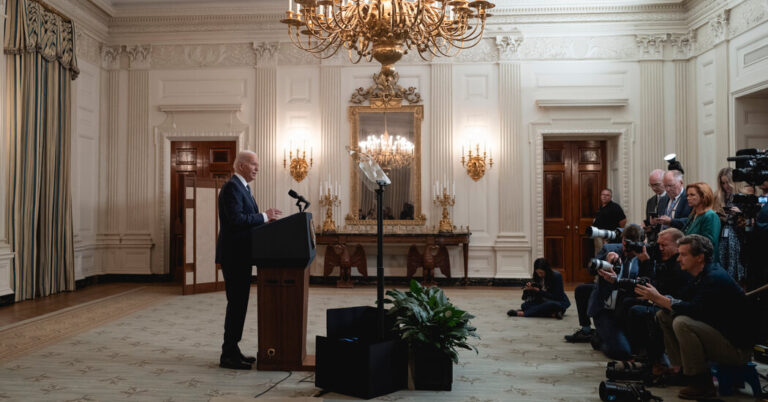Friday’s remarks were Mr. Biden’s first public comments on the war since an Israeli strike and ensuing fires on Sunday killed at least 45 people, including children, and injured 249 at a camp for displaced people, according to Gaza health officials. A visual analysis by the New York Times found that Israel used U.S.-made bombs in the strike, forcing the White House to face tough questions about U.S. responsibility for the rising death toll.
Mr. Biden said Friday he had seen the “terrible images” of the deadly fire.
“The Palestinian people have endured real hell in this war,” Mr. Biden said after describing the pain of those whose loved ones were “massacred by Hamas terrorists on October 7” and the “anguish” of families Israelis awaiting the release of the hostages. .
Mr. Biden also said too many innocent people had been killed in Gaza, “including thousands of children,” and addressed the many Americans furious at his administration’s handling of the conflict.
“I know this is an issue that people in this country have deeply, passionate beliefs about,” Mr. Biden added. ” Me too. This has been one of the most difficult and complicated problems in the world. There’s nothing easy about it.
In describing the four-and-a-half-page Israeli proposal, Mr. Biden said it would be divided into three phases. The first would begin with a ceasefire of approximately six weeks, the withdrawal of Israeli forces from populated areas of Gaza and the release of elderly and female hostages held by Hamas, in exchange for the release of hundreds of Palestinian detainees. Mr. Biden said there were still details to be negotiated to move to the next phase – apparently including the number of Palestinians who would be released in exchange for each Israeli hostage freed.
In the second phase, as described by a senior administration official who briefed reporters after Mr. Biden’s speech, all remaining Israeli hostages would be released, including male soldiers. All hostilities would end and, the official said, all Israeli forces would withdraw from Gaza. In the past, Mr. Netanyahu has publicly rejected a full withdrawal, saying it would lead to a resurgence of Hamas, which once again controls the territory.
It is unclear from the description given to reporters at the news conference who would govern the territory, although in the past the United States has said it would most likely be the Palestinian Authority, which has difficulty managing the West Bank.
In the third phase, the remains of deceased hostages would be exchanged, the rubble would be cleared, and a three- to five-year reconstruction period would begin, with support from the United States, Europe, and international institutions. But this plan seemed almost ambitious, given the level of destruction and near-starvation conditions.
Mr. Biden, however, called this road map reasonable – if the terrorist group accepts it. “As long as Hamas respects its commitments, a temporary ceasefire will become, under the terms of the Israeli proposal, a permanent cessation of hostilities,” Mr. Biden said.
U.S. officials said they believed that following the meeting in Paris last weekend between William J. Burns, the CIA director, and David Barnea, the head of the Israeli spy agency Mossad, Israel had made significant concessions on hostage talks. This included reducing the number of living hostages whose release was necessary from the start.
Yet a person briefed on the matter said negotiations were “on pause” while Israel conducts its operations in Rafah.
Mr. Biden was also involved in the hostage talks, although he did not travel for any of the negotiating sessions. Mr. Biden’s role, the officials said, was particularly notable in pressuring Mr. Netanyahu to continue negotiating and reducing Israeli demands.
But on Friday, Mr. Biden was clearly focusing his pressure on Hamas, arguing that accepting the offer was their best chance to end the war and move toward a ceasefire.
“Everyone who wants peace now needs to raise their voices,” Mr. Biden said, adding that the public should let Hamas leaders know “that they should accept this deal.” Work to make it real, make it sustainable, and forge a better future after the tragic terrorist attacks and war.
Aaron Boxerman contributed to reporting from Jerusalem, and Julian E. Barnes of Washington.


